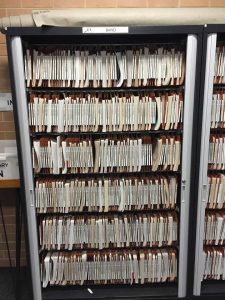Performing Arts Library & Academic Library
Why they are so different and should be kept separate
by Yvonne Lang

We would all agree that the ‘Performing Arts’ is an incredibly vibrant part of any school, college or university and as such, encompasses a unique set of talents. As professionals in our field, we understand the intricacies of our chosen profession. We also appreciate the variety of skill sets required as teachers.
The Performing Arts is an area of constant change requiring continuous resources to feed its large appetite for new repertoire, innovation and excellence. The enormous amount of specialised resources such as musical instruments and other related equipment is vast and expensive. No other subject brings with it such diversity of specialised resources or degree of investment of money however, the rewards are priceless as the lifelong experiences received are memorable and the enhanced profile of the institutions that excel is also noted.
With this expertise comes responsibility for accountability to both the parents, students and organisations such as schools.
The Academic Library
The Academic library is one with which we are most familiar. There is an aura of calmness as we step inside the door and the  books and other resources are all sorted according to the Dewey system that we all know so well. There are of course, books about the Performing Arts as well as recordings in another section, and these are all relevant and important. However, they are not the kind of resources that you need when it’s time to hand the music out to the orchestra, band or choir. The resources in this library are reference texts and are academic in nature. Therefore they correctly belong in the academic library.
books and other resources are all sorted according to the Dewey system that we all know so well. There are of course, books about the Performing Arts as well as recordings in another section, and these are all relevant and important. However, they are not the kind of resources that you need when it’s time to hand the music out to the orchestra, band or choir. The resources in this library are reference texts and are academic in nature. Therefore they correctly belong in the academic library.
This is where we draw the major difference between the Academic library and the Performing Arts library.
The Performing Arts Music Library
The Performing Arts Music Library on the other hand holds items that have multiple parts within one item that together make the sum total (or the set) of the item. They require other classifications or categories such as String Orchestra and Jazz Ensemble that the Academic library cannot handle or catalogue.
 The location and access to the library is also critical to the success of the Performing Arts Program and it is very much a ‘hands on’ issue. Like-categories need to be classified and stored together in large sections to assist retrieval by having quick and easy access. Often rehearsals take place out of normal school hours and are held in the Performing Arts rehearsal rooms or areas. If a change of, or problem with repertoire is required or detected, it needs to be attended to immediately.
The location and access to the library is also critical to the success of the Performing Arts Program and it is very much a ‘hands on’ issue. Like-categories need to be classified and stored together in large sections to assist retrieval by having quick and easy access. Often rehearsals take place out of normal school hours and are held in the Performing Arts rehearsal rooms or areas. If a change of, or problem with repertoire is required or detected, it needs to be attended to immediately.
Also, the selection of repertoire for a performance ensemble is done with vastly different criteria in mind to an Academic library. This too constitutes a major difference. A powerful database is required to be able to search using various criteria such as skill level, style and sub categories as well as title and composer and/or arranger. The variables involved are many, and this creates the complexity of a Performing Arts library which requires a specialist database system.
- Search for the music in the computer first –
- Then retrieve the music from the Music Library
Performing Arts is an all-inclusive subject covering the practical availability of instruments for rental or loan and the tracking of them, through to choosing repertoire, rehearsing, developing an ensemble and creating a concert. Bringing together the multiple resources which are so inextricably linked to each other is unique only to the Performing Arts.
Further details and resources also need to be managed, such as the repairs and maintenance of instruments and equipment, performance ensembles and budgeting, just to name a few.
The Performing Arts Music Library is more than a catalogue of titles and composers. It is a specialised working library with demands placed on it all times of the day and it is specific to the Performing Arts.
This is why it cannot be successfully integrated with the traditional Academic Library. It requires a specialised database system as it plays its own significant role within the Performing Arts.

